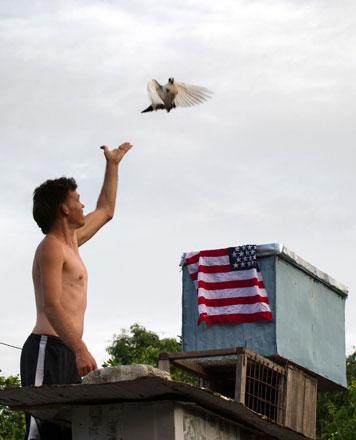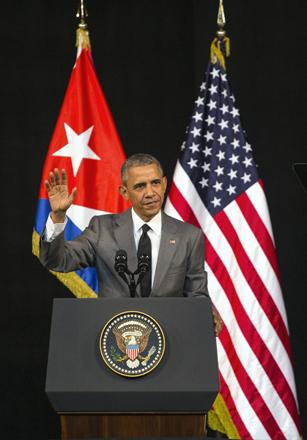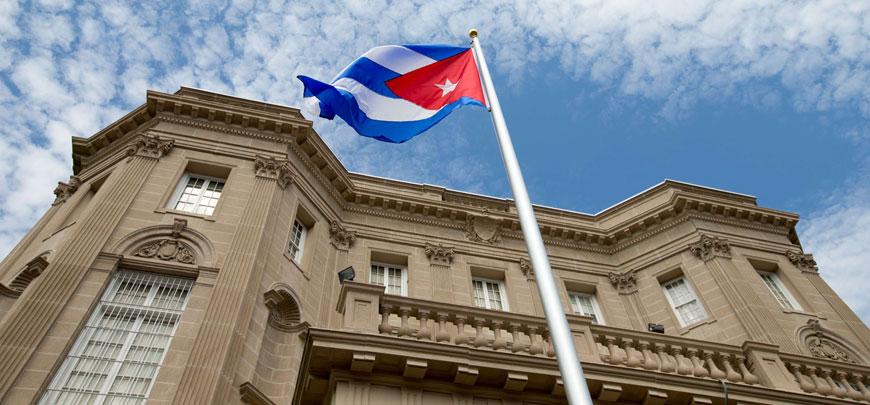You are here
US, Cuba agree to restore ties, embassies to reopen
By AFP - Jul 01,2015 - Last updated at Jul 01,2015

A man releases a pigeon next to a US national flag in Havana on Wednesday (AFP photo)
Washington — The United States and Cuba on Wednesday agreed a historic deal to re-establish full diplomatic relations, severed 54 years ago in the angry heat of the Cold War.
Presidents Barack Obama and Raul Castro exchanged letters agreeing to unfreeze ties on July 20, when embassies in Washington and Havana can be reopened.
Obama hailed the deal as a "historic step forward" that would end a failed and archaic policy of isolating the still Communist-ruled island.
Obama — who was born the year the US embassy was closed — called on domestic critics to stop "clinging to a policy that was not working".
He pressed the Republican-controlled Congress to end a throttling US trade embargo set up in 1962.
"It's long past time for us to realise that this approach doesn't work," he said in a White House Rose Garden address.
"It hasn't worked for 50 years. It shuts America out of Cuba's future and it only makes life worse for the Cuban people."
US president Dwight Eisenhower shuttered the US embassy in Havana on January 3, 1961, after a guerrilla insurgency brought Fidel Castro to power and placed Cuba firmly within the orbit of the Soviet Union.
The embassy closure foreshadowed conflagrations across the Straits of Florida that would define an era: from the failed Bay of Pigs invasion to the crisis over Russian missiles sites in Cuba.
Raul Castro on Wednesday expressed his desire to "develop respectful and cooperative relations between our two peoples and governments", in his letter to Obama.
Half a lifetime ago, Castro landed in Cuba with his older brother Fidel, Argentine revolutionary Che Guevara and dozens of other rebels to overthrow the unelected US-backed government.
On July 20, he will send Foreign Minister Bruno Rodriguez to open the Cuban embassy in Washington.
The delegation will include "prominent representatives of Cuban society" the government said in a statement.
No date was set for opening the US embassy in Cuba, but Obama announced that "later this summer, Secretary John Kerry will travel to Havana formally to proudly raise the American flag over our embassy once more”.
Republican opposition
Polls show a majority of Americans support Obama's efforts to improve ties.
But powerful Cuban-Americans oppose restoring ties with Havana's government and could yet pose problems for further rapprochement.
Republican presidential candidates who have ties to Cuba, including Marco Rubio and Ted Cruz, have been outspoken in their opposition to the thaw.
Rubio, a senator from Florida, accused Obama of giving concessions as Cuba continued to stifle democracy.
"It is time for our unilateral concessions to this odious regime to end," he said.
"I intend to oppose the confirmation of an ambassador to Cuba until these issues are addressed."
Cruz, from Texas, said he would "work to disapprove any new funds for embassy construction in Havana".
"Unless and until," he added, "the president can demonstrate that he has made some progress in alleviating the misery of our friends, the people of Cuba."
Back channels
After 18 months of secret talks between Havana and Washington — and aided by the Vatican — the two countries agreed in December to begin warming relations.
The pair held a historic meeting in Panama in April — the first sit-down between leaders of the US and Cuba since 1956.
Travel and communications restrictions between the two countries have been significantly eased.
In May, the United States paved the way for further rapprochement by taking Cuba off the list of state sponsors of terrorism.
Havana had vehemently protested its 1982 inclusion on the blacklist, which hampered its access to global markets.
Final negotiations on re-opening the embassies had been dominated by discussions over the free movement of diplomats.
A senior State Department official said that officials would now need to simply inform the Cuban authorities about their movements, rather than ask permission.
Related Articles
HAVANA — US President Barack Obama delivered an impassioned appeal for political liberties in Cuba, including freedom of expression and reli
WASHINGTON — The Cuban flag on Monday was proudly hoisted over Havana's newly restored embassy in Washington for the first time in 54 years
Washington — John Kerry has a date with history.

















